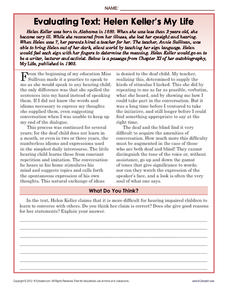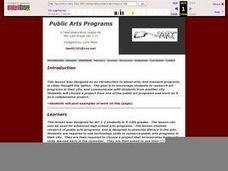Curated OER
Choosing and evaluating a range of subject matter, symbols, and ideas
Art is a great way to convey or express an idea. Learners choose an idiom, draw it, and use transfer paper to create photograms. They discuss how why they chose the phrase they did, and how they expressed that idea through their drawings.
Curated OER
The Power of the Image: Understanding Symbols in Buddhist Art
Students discuss symbolism in art, examine various images of compassion in Buddhist tradition, analyzing components of the concept, and then produce their own images of compassion through art.
Curated OER
A Critical Look at Aboriginal Art
Students observe art from different Aboriginal cultures. In this art evaluation lesson, students discover the different traditions of cultures from the Pacific North West. Students judge the art from these cultures with a specific...
Utah Education Network (UEN)
Evaluating the Format of Informational Text
Make your learners aware of the advantages and disadvantages of using different media in presentations. This straightforward resource evaluates media formations such as print, digital text, and videos. Although the subject of ballet is...
K12 Reader
Evaluating in Math
Help kids understand problem-solving strategies by focusing on academic language in a reading comprehension activity. After reading paragraphs about the words solve and evaluate, learners answer five reading comprehension questions.
J. Paul Getty Trust
Looking and Learning in the Art Museum — Lesson 3
Curator, artist, art handler, archivist, conservator-restorer, guide. Who would have thought there were so many different kinds of museum professionals? After a visit to an art museum, class members reflect on the role of the museum in...
Curated OER
The Art and History of Japanese Calligraphy
Chinese and Japanese calligraphy is beautiful and significant in both culture and tradition. Engage your class in this expressive fine art form through a activity on using, holding, and creating brush strokes common to Japanese writing...
K12 Reader
Evaluating Text: Helen Keller's "My Life"
Readers are asked to evaluate Helen Keller's claim, and the evidence she uses to support her argument, that it is more difficult for hearing impaired children to learn to talk with others.
EngageNY
Grade 9 ELA Module 4, Unit 1, Lesson 19
Building on the previous discussion of the supplemental reading article "Where Sweatshops Are a Dream," class members use the provided Evaluating Argument and Evidence Tool to identify the claims and evidence Nicholas Kristof uses to...
Curated OER
Differentiated Language Arts
Pupils read speeches and identify the main idea as well as the literary techniques employed, paying careful attention to the persuasion and repetition elements that each speech possesses. Using a graphic organizer, they analyze,...
Curated OER
Public Arts Programs
Students choose a project from one of the public art programs and work on it as a collaborative project. The goal is to encourage students to research art programs in their city, and communicate with students from another city.
Curated OER
The Elements of Art Through Photography
Fifth graders photograph examples of the five elements of art: line, shape, color, pattern, and composition.
Sargent Art
Destination Art: Paper Mola Collage
The Kuna Indians hail from the San Blas Island near Panama. Learners will investigate their culture by creating paper mola collages, just like the ones created by the indigenous Panamanians. They'll focus on understanding the symbolism...
Curated OER
Research Skills: Evaluating Information and Sources
While this focuses on Ancient Rome, the objectives are improved research and information evaluation skills. In one class period, class members narrow their topic, research it, select the best information, log useful sources, and discuss...
Curated OER
Savvy Surfers: Website Evaluation and Media Literacy
Sixth graders strengthen their understanding of what a high quality website is composed of. Learners evaluate three websites for accuracy, credibility, and reliability by completing a chart.
Fluence Learning
Writing Informative Text: Did Shakespeare Write Shakespeare?
William Shakespeare penned some of the richest and most fascinating works of literature—or did he? Middle schoolers read three brief informative passages and conduct additional research to evaluate the claim that Shakespeare did not...
EngageNY
Writing an Argument Essay: Evaluating the Model and Crafting a Claim (Chapter 28, Including Synthesis of Scenes in Previous Chapters)
Scholars use the model essay from the previous instructional activity to create their own argumentative essays. Readers make a claim about Atticus defending Tom in To Kill A Mockingbird. They then use graphic organizers to develop and...
EngageNY
Mid-Unit Assessment: Classifying and Evaluating Primary Sources
Let's go for a walk. Learners complete the mid-unit assessment by completing a gallery walk to analyze different primary sources discussed while reading A Mighty Long Way. After viewing the sources, class members complete organizers and...
EngageNY
End of Unit Assessment Parts 1 and 2: Evaluating Arguments and Claims
Which came first: the chicken or the egg? As part of the end-of-unit assessment for The Omnivore’s Dilemma, scholars watch a video about organic eggs versus conventional farm eggs. They use graphic organizers to collect evidence as they...
Curated OER
Traders of the Lost Art
Learners work in small groups to investigate a variety of art and architecture forms common during the Old Kingdom epoch in Ancient Egypt. Learners then evaluate how these art forms reflect a culture's beliefs and values. And, finally,...
Curated OER
The Process of Art Criticism
High schoolers interpret possible meanings of works of art by analyzing how specific works are created and how they relate to historical and cultural contexts
Curated OER
How to Locate and Evaluate Information, Part III - Internet Sites
This is the third in a series of lessons scaffolding the research paper. It purports to teach researchers how to evaluate internet sites, but the lack of links, specific criteria, or site evaluation rubrics would require additional...
Curated OER
Evaluating Information Quality
Young scholars evaluate information they are given and identify the quality of the information as fact, fiction, and point of view. In this information quality lesson plan, students also discuss how they can pick out good information...
EngageNY
End of Unit Assessment: Tracing and Evaluating Arguments
Give water the attention it deserves. Scholars watch Corporations Need to Pay More Attention to Water and respond to questions as part of their end of the unit assessment. They then complete the assessment by reading and responding to...

























